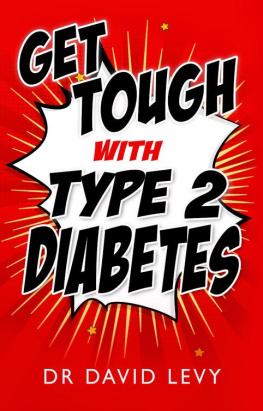Dr David Levy was Consultant Physician in the Gillian Hanson Centre for Diabetes and Endocrinology, Whipps Cross University Hospital, London, UK and Hon Senior Lecturer at Queen Mary University of London, UK, until December 2014. He is still in active clinical practice, specialising in diabetes and endocrinology, and is the author of many books for healthcare professionals, including Practical Diabetes Care (4th edition, 2018), Type 1 Diabetes (2nd edition, 2016) and The Hands-on Guide to Diabetes Care in Hospital (2015), reflecting his interest in all aspects of clinical diabetes care.
Having Type 2 diabetes is tough. This book acknowledges that its tough, but its even tougher for Type 2s if they are continually bombarded by myths based on a misunderstanding of what Type 2 actually is. The prime myth is that Type 2 is caused by eating too much sugar, which then causes high blood glucose levels. Its tougher still when instructions about treatment come at us from all sides (for example, that treating Type 2 means stopping eating sugar, and if that doesnt work, then medication is needed, and eventually probably insulin all inaccurate statements).
These simple tales about Type 2 never really made much sense, yet they continue to be told, believed and acted on. But over the past 20 years weve come to understand much more about the underlying causes of Type 2, and at last were beginning to see proper scientific studies that take this new understanding and translate it with great success, as well see into treatments that are logical and therefore work. There is now clear trial evidence that, with admittedly rather tough interventions involving substantial weight loss, Type 2 can be reversed, and at last we can start thinking about managing the condition without the need for ever more blood glucose-lowering drugs. High blood glucose is the end result of Type 2 diabetes, not its cause.
Blood glucose is only one partner in the damage caused by Type 2 diabetes, and in fact it isnt as important as we once thought in the development of serious diabetes complications. Its abundantly clear that high blood pressure and abnormal cholesterol levels are at least as important in the heart attacks, strokes and kidney disease that are the most devastating long-term complications of diabetes. With careful and evidence-based lifestyle changes we can make real inroads, not only into high glucose levels but high blood pressure, with clear short- and long-term benefits. Cholesterol levels can be helped by careful attention to diet, though the high vascular risk of Type 2 means that medication is normally needed.
Diet and weight control are central to the day-to-day management of Type 2, and I discuss some of the newer ideas (see ). I also discuss the lessons to be learned from major clinical studies of diets. These include the Mediterranean approach, which reduces the risk of heart attacks, and possibly of cancer, and the lower-carbohydrate diet, which for many people is a more sustainable way of controlling weight than the traditional high-carbohydrate, low-saturated fat diet, which is coming under increased pressure from evidence (and, like the idea of sugar causing Type 2 diabetes, was never really convincing).
Specific kinds of exercise and activity are important in many aspects of diabetes, although they dont have the same dramatic short-term effect as diet and weight loss. The evidence for the long-term benefits of exercise is distressingly thin, but regular moderate or vigorous exercise very likely reduces most of the complications of long-term diabetes, including premature death. We mustnt ignore the compelling evidence on activity and its important beneficial effects on general health, including perhaps postponing the frailty of later life.
Type 2 mostly affects people in middle age, and increasingly they are growing old gracefully with diabetes, because the complications that used to limit life expectancy are much less common than when I started working in diabetes in the 1980s. For that reason, Type 2 in older people is becoming a sub-specialty in its own right, because managing diabetes in later life requires an even more sensitive and careful approach than in younger people: kids with Type 1 diabetes need specialist paediatricians, so why shouldnt older Type 2s have their own experts?
Finally, it doesnt matter how much whiz-bang technology and clever new drugs there are, if youre depressed or distressed by your diabetes, everything will be more of a burden and less effective, so psychological approaches to Type 2 diabetes are tackled in and if this little book ever comes to a revision, psychology may well come right at the beginning.
Ten years ago I wrote my first book for people with Type 2 and their carers, and at the time it seemed quite easy. The process was inadvertently helped by my publisher at the time thinking that the preliminary draft I sent him was the very final version, and he duly sent off my first thoughts for publication. Nobody noticed. In addition, back in 2007 we had very little evidence for the benefits of non-drug treatments, and too much of the book was devoted to current and upcoming medicines. Around the same time, some of the drugs turned out to have unexpected and severe side-effects, and since then I have become generally less enthusiastic about drug treatments, while recognising that when used carefully and sensitively they are, of course, extremely valuable. But we must always try to minimise the use of medication, and there is a separate chapter (page ) on how to approach this with caution, of course, professional support, naturally, but with some optimism.
Former colleagues at Whipps Cross University Hospital helped me to think through many of the topics covered in this book, and my current colleagues, especially Carin Hume and Una Vince at The London Diabetes Centre, have continued my education. Timo Pilgram, librarian at Whipps Cross, sourced references and scanned obscure medical niches of the internet, as he has done for all my recent diabetes books. My wife Laura scanned obscure culinary corners of the internet to maintain my food interest while writing, and helped with the sections on practical aspects of diet, especially the Mediterranean approach, which we aim to sample at least twice a year in countries where it originated. Carrying out scientific research is tough for authors.
Georgina Bentliff, publisher of Hammersmith Health Books, helped a great deal with the concept of the book. She commissioned it, cajoled me over deadlines no toughness there, of course and she and her team scrutinised the manuscript for evidence of plonky medical-speak, the clinical equivalent of management-speak or politician-speak. You know the kind of thing: the limited results from this prospective cohort study indicate that there may be some evidence for the increased efficacy of drug A compared with drug B, though further and larger trials are needed to confirm these preliminary findings If any similar horrors remain, blame me. It may be gently advancing age, but Ive been amazed how difficult it was to write this book for non-medical people compared with my textbooks for professionals. Ive never had to consign so many drafts to the electronic black-hole by activating the delete button. Although were trying to get tough with diabetes, no author should increase the difficulty for people with Type 2 by using indecipherable language, so let me or Georgina know if I could have done better.
David Levy
January 2018
A note on numbers and units
Blood glucose is measured in mmol/l [milly-mole per litre]. Many countries use a different measurement milligrams per decilitre (mg/dl). To convert mmol/l to mg/dl, multiply by 18.









